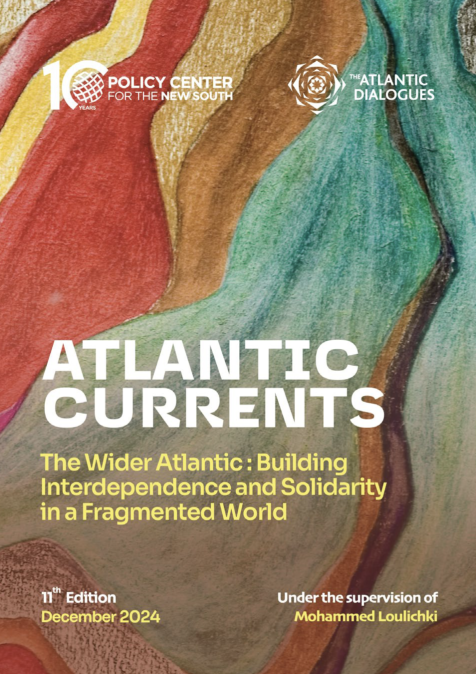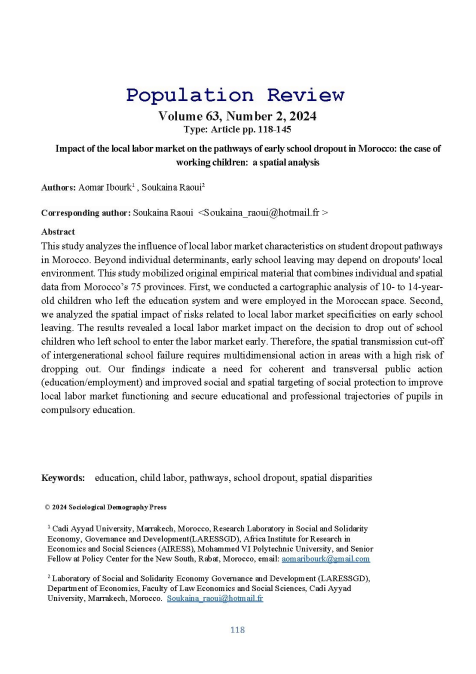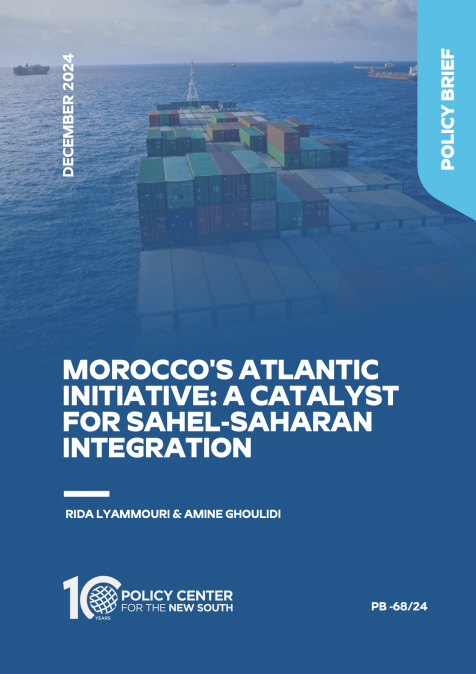In this interview, with Mr.Carlos Alexandre Monteiro Reis, Head of the Rabat Programme Office, UNOCT, Morocco, we discuss the current efforts being undertaken to counteract the radicalization of extremist movements, as well as the need for enhanced cooperation to support impoverished and less educated regions. We explore the connection between extremism and socioeconomic conditions, examining how collaboration can effectively address and mitigate these phenomena.
RELATED CONTENT
-
 AuthorsUnder the supervision of Mohammed LoulichkiDecember 12, 2024The 11 edition of Atlantic Currents explores the evolving dynamics within the Atlantic region. As the world grapples with profound transformations and unprecedented challenges, the Atlantic Basin emerges as a strategically significant area, transcending the traditional perception of marginalization. The 2024 edition highlights the intensifying political, economic, and societal exchanges across the region, showcasing its potential to address shared global challenges effectively and ...
AuthorsUnder the supervision of Mohammed LoulichkiDecember 12, 2024The 11 edition of Atlantic Currents explores the evolving dynamics within the Atlantic region. As the world grapples with profound transformations and unprecedented challenges, the Atlantic Basin emerges as a strategically significant area, transcending the traditional perception of marginalization. The 2024 edition highlights the intensifying political, economic, and societal exchanges across the region, showcasing its potential to address shared global challenges effectively and ... -
Kidane Kiros & Paul IsbellDecember 11, 2024The Atlantic Basin holds unique promise as a space for fostering liberal international cooperation amidst growing global fragmentation. Historically dominated by the Northern Atlantic, th ...
-
Kidane Kiros & Paul IsbellDecember 11, 2024The Southern Atlantic is emerging as a pivotal region in global power dynamics, situated at the intersection of competing realist and liberal perspectives. Historically overlooked in favo ...
-
AuthorsAmine GhoulidiDecember 10, 2024Morocco, leveraging its strategic position and proven expertise in infrastructure development, has proposed an ambitious framework to reconnect the Sahel to global supply chains via its Atlantic coastline. The Sahel’s vast distances and dispersed population have historically deterred significant infrastructure investments, perpetuating a cycle of underdevelopment. Morocco's strategic initiatives in infrastructure stand out as potentially transformative, adopting a comprehensive appr ...
-
 AuthorsZakaria ElouaourtiDecember 8, 2024This paper was originally published on accscience.com The Coronavirus disease 19 (COVID-19) pandemic has significantly affected the global workforce, with certain occupational groups facing greater challenges than others. Atypical part-time, temporary, and gig job workers are among the most vulnerable. This paper first examines the impact of the COVID-19 health crisis on atypical/ contingent workers by firm size, industry, and region. Second, we explore the factors determining the ...
AuthorsZakaria ElouaourtiDecember 8, 2024This paper was originally published on accscience.com The Coronavirus disease 19 (COVID-19) pandemic has significantly affected the global workforce, with certain occupational groups facing greater challenges than others. Atypical part-time, temporary, and gig job workers are among the most vulnerable. This paper first examines the impact of the COVID-19 health crisis on atypical/ contingent workers by firm size, industry, and region. Second, we explore the factors determining the ... -
AuthorsBoglarka BozsogiDecember 6, 2024Communities around the Lake Chad Basin (LCB) rely on three major economic activities: farming, fishing, and livestock herding. The floods that began in August 2024 damaged and destroyed hundreds of thousands of hectares of farmland, killed thousands of livestock, and rendered fishing unsafe for fishermen. This climate shock caused families dependent on these activities to lose their primary sources of income. Worse still, these economic activities also serve as the main source of da ...
-
December 3, 2024نستضيف في هذه الحلقة الأستاذة رجاء بنسعود، المتخصصة في قانون الأعمال والتحول الرقمي، لنسلط الضوء على مستقبل التحول الرقمي في المغرب من خلالاستراتيجية "المغرب الرقمي 2030". سنتناول أبرز الإنجازات التي حققتها المملكة في هذا المجال، كما سنناقش الأهداف الطموحة لهذه الاستراتيجية والتحديات ال...
-
Rim Berahab & Hung TranDecember 02, 2024The global energy transition is unfolding amid escalating geopolitical tensions, record-breaking temperatures, and trade wars. This podcast examines the U.S.-China rivalry over critical m ...
-
 AuthorsDecember 2, 2024This blog was originaly published on orfonline.org. The maritime industry is the lifeblood of global trade, with ships carrying over 90 percent of all merchandise trade, and the global logistics market accounting for 8-12 percent of global gross domestic product (GDP). The smooth functioning of maritime trade and supply chain logistics is integral to economic development and critical to food security and the distribution of essential supplies. In fact, the COVID-19 pandemic has ...
AuthorsDecember 2, 2024This blog was originaly published on orfonline.org. The maritime industry is the lifeblood of global trade, with ships carrying over 90 percent of all merchandise trade, and the global logistics market accounting for 8-12 percent of global gross domestic product (GDP). The smooth functioning of maritime trade and supply chain logistics is integral to economic development and critical to food security and the distribution of essential supplies. In fact, the COVID-19 pandemic has ... -
 AuthorsSoukaina RaouiDecember 2, 2024This paper was originaly published on muse.jhu.edu This study analyzes the influence of local labor market characteristics on student dropout pathways in Morocco. Beyond individual determinants, early school leaving may depend on dropouts’ local environment. This study mobilized original empirical material that combines individual and spatial data from Morocco’s 75 provinces. First, we conducted a cartographic analysis of 10- to 14-year-old children who left the education system ...
AuthorsSoukaina RaouiDecember 2, 2024This paper was originaly published on muse.jhu.edu This study analyzes the influence of local labor market characteristics on student dropout pathways in Morocco. Beyond individual determinants, early school leaving may depend on dropouts’ local environment. This study mobilized original empirical material that combines individual and spatial data from Morocco’s 75 provinces. First, we conducted a cartographic analysis of 10- to 14-year-old children who left the education system ...





